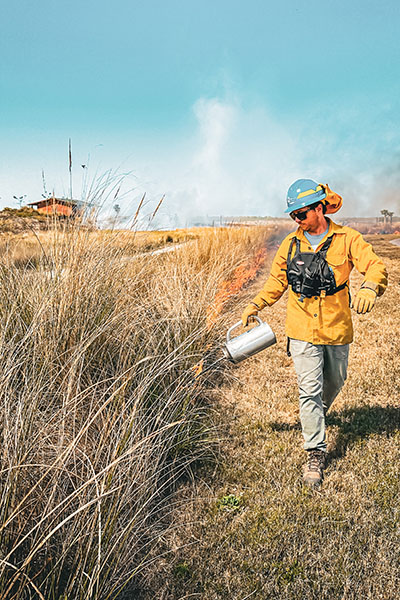July 18, 2025
from the Record, Spring 2025
WATERMELON CALL
Manatee County, Florida
Not many love stories start with a blue ribbon in a watermelon-eating contest, but for Shaun Swartz ’10 and marine science, that’s exactly what happened. First-place prize for the contest, which was held during his study abroad trip to Australia, was an introductory scuba diving course. Building on a lifelong love for the ocean and the natural world born from countless hours in the woods growing up as a Boy Scout, Shaun says he could think of nothing else but being underwater and finding a way to work in the marine sciences after his first dive. Luckily, the rest of his program showed him just how to make that happen.
“The courses I took when I was studying abroad really showed me the career paths available for people who are interested in environmental science,” Swartz says. “Courses like Conservation of Marine Wildlife and Rainforest Ecosystems that combined high-level science instruction and field work were really impactful for me.”
Since then, Swartz has traveled the world teaching marine science and working as a habitat restoration practitioner before landing on the coast of the Gulf of Mexico as the ecological resources coordinator for the Natural Resources Department of Manatee County, Florida, Government. Manatee County’s Natural Resources Department manages more than 26,000 acres of conservation land, and Swartz’s work spans the full lifecycle of that land from the initial purchase to restoration and long-term land management.
Boasting the third largest barrier reef ecosystem in the world, the greatest concentration of freshwater springs globally, and hundreds of rare plants that can’t be found anywhere else on the planet, Florida is at a critical turning point for environmental a conservation efforts. “Important parts of the conservation process such as policy-making and project funding opportunities often happen at the state and federal level,” Swartz says, “but local government is where the rubber meets the road. Agencies provide the funding through grant awards and other financial pathways, and we execute the large-scale restoration work necessary to move the needle for local conservation needs.
Living by the motto “think globally, act locally,” Swartz says the future of conservation will be determined by how local communities work to protect their corners of the earth. Engaging citizens in conservation and restoration efforts has been pivotal for Swartz throughout his 14 years as an environmental scientist. He says that collaboration between local government and citizens is critical to making conservation efforts successful.
“The natural world doesn’t adhere to the borders humans have drawn on a map,” he concludes. “The decisions communities make ripple out to affect every corner of the planet.”
Real change doesn’t have to mean transforming the entire world—it can be as simple as caring for your own backyard.


